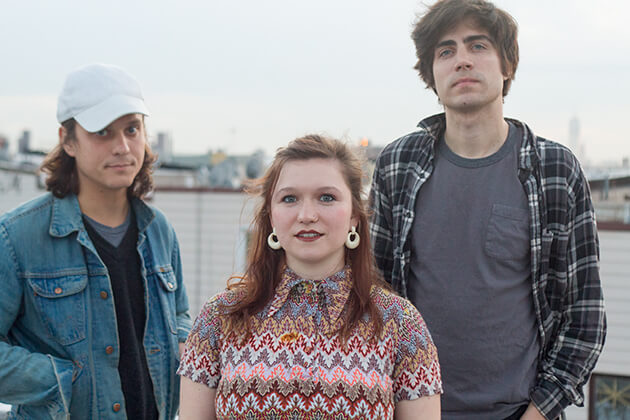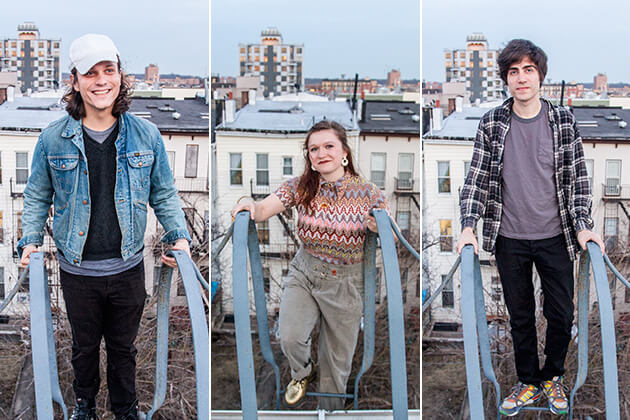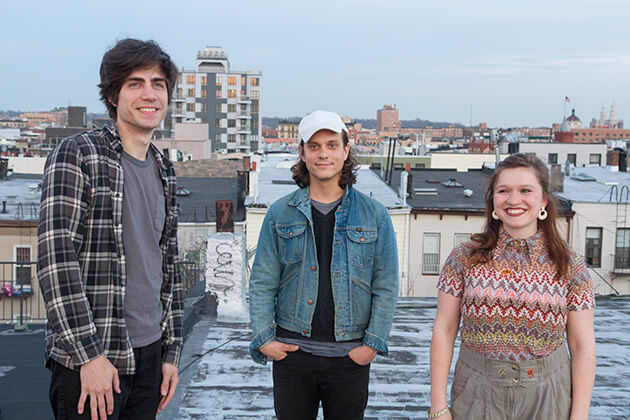Inside Bushwick’s Internet-Enabled, Ever-Evolving Collective of Musicians, Phantom Posse
It only takes a few sips of whiskey-spiked tea with the members of Bushwick music collective Phantom Posse before they insist on queuing up “Sneaky Lady” on a nearby laptop. The track, an early home-recording by Atlanta’s Makonnen Sheran, aka still-blowing-up, Drake-co-signed rapper iLoveMakonnen, is something of a mythic sigil for the group’s members, and key to understanding how one of the buzziest rappers in the world fits into their hazy chill-pop aesthetic. In it, Makonnen laments in a liberated yelp over excitable piano bar pounding that “a real sneaky lady, she’ll be stealing your heart…” Out of a pile of SoundCloud links Makkonnen forwarded to group leader Eric Littman out of the blue a few years back, it was the first to really resonate, becoming a shared secret jam passed through email threads among the loose association of friends and collaborators that would eventually make up Phantom Posse. Littmann was then recording music solo under the name Phantom Power, a lucky coincidence that started the creative relationship that might now seem unlikely. “I guess he was calling his group of Internet friends at the time ‘Phantom Power’ so he ended up Googling it,” says Littmann. “It was totally nuts.”
The railroad apartment where Littmann and vocalist Nadia Hulett live also acts as Phantom Posse’s main recording studio, communal dinner locale, social hub, and drinking nook. They’re joined at its kitchen table by Chris Masullo, who often plays around Brooklyn with his own experimental pop project Nicholas Nicholas, and Cale Israel, the Posse’s drummer and horn player. It’s enough people to push the room to max capacity, but they only represent 40 percent of the group’s membership. The credits for the band latest’s record, Home, self-released this January, lists a roll call of ten members including Makonnen, visual artist Sandra Seminara, and Australia-based vocalist Renee Anderson, who’s never had a face-to-face meeting with the rest of the gang that wasn’t piped in via FaceTime screen. Theirs is an open-source, Internet-enabled method of collaboration, an occasionally assembled Voltron of bedroom recorders with overlapping sensibilities that would have been inconceivable even a couple decades ago. “We just trade files. That’s how Makonnen and I used to work, too,” notes Littmann. “He wasn’t allowed to leave the state of Georgia for a while.” With their modern method of collaboration, a little thing like a house arrest is hardly an obstacle.
Littman, who also makes a very different kind of K Records-informed indie-pop under the name Steve Sobs, serves as the group’s curator and creative director. He’ll start most songs himself and give suggestions to the rest of the members for their completion. Albums are started in small batches of two or three, based on who can be in town or even fit in the room. Subsequent parts are completed gradually, each member chiming in with their own method, in their own time. “If he just sent me the tracks and didn’t give me any prompts or anything, I could go hog on it,” says Isreal, a former jazz nerd and middle school chum of Littman’s who’s currently visiting for the weekend from his own home base in Boston. “But usually it’ll be like, ‘Some fills would be nice here, some trombone would be pretty sweet.’ So I’m like, ‘Yeah! I don’t really have to do too much thinking myself.’ ” Home really took off after a rare in-person session with Makonnen in Bushwick in July, the rest of the group finishing it bit by bit until fall.
The breakout success of iLoveMakonnen’s single “Club Goin Up on a Tuesday” has launched him to legitimate stardom, but hasn’t much changed the group’s deep creative relationship. Masullo and Littman watched together as he performed the song on Late Night with Jimmy Fallon, vicariously geeking out. “He was playing with The Roots,” recalls Littmann. “The only other band that has backed him up so far has been Phantom Posse.” That Makonnen’s level of exposure has given greater visibility to Phantom Posse and the assorted projects of its individual members is, Masullo says, “undeniable.” Yet with so many creative collaborators, any one participant can’t really be definitive. “Makonnen’s a big part of Phantom Posse,” says Littmann. “But that’s not the whole picture.”
The Phantom Posse sound is warm and relaxed, a little bit post-Ariel Pink lo-fi and a little bit smoke-strung jazz club, with some gentle new age crystal worship thrown in. They hold up the recombinant lounge, bossa nova, and pop strains in a band like Stereolab as a “holy grail,” even though that band’s level of sharp production stands in contrast to the home-recording ethos that’s been a defining aspect for them so far. “I’ve never been in a real studio setting,” says Littmann, “and honestly I’ve just been doing this so much that I bet it would slow me down.” It may be the group’s eventual destiny, but the geographical challenges of convening that way, not to mention the expense, isn’t currently in the cards. “If we had that luxury, I’m sure we could make something that we would be proud of,” says Masullo. “It’s just not the reality.”
For now, the collective’s reality seldom includes live performances with a full, present membership either. Phantom Posse is a “special event,” a chance happening for when the stars fully align. They notably brought Makkonnen to Bushwick’s DIY space Silent Barn for a full group show at the first flush of his fame. More recently they played some SXSW dates this year, tied to Nadia’s solo EP, getting a further a taste of the full-band experience: practicing in a Motel 6, playing dodgy all-DJ bills, fighting to be heard against the noise of punk bands wafting over from other backyard venues. But that sort of mundane struggle might act against the group’s casual magic. “We’ve gotten lucky where every time it happens it’s been fun and good,” says Masullo. “We’re not at the point where we can go on the road and play a bad show.” Fun and good seem to be the key words.
“I want to explore some other parts of myself musically,” says Hullet, whose own solo stuff veers towards the smart, spare work of L.A. songwriters like Nite Jewel or Julia Holter. “Just try something new.”
“I think we allow ourselves to get pretty…” starts Masullo, a thought Hulett finishes with “silly” before he gets the chance.
“With our own projects involve a lot more doubt and stress and that doesn’t factor into this so much,” he continues. “It’s kind of released from that.”
Littmann ultimately agrees. “Making these songs and this last record isn’t this labor where it’s like, fuuuuuuck. It’s not that kind of struggle.”
You might also like 






















